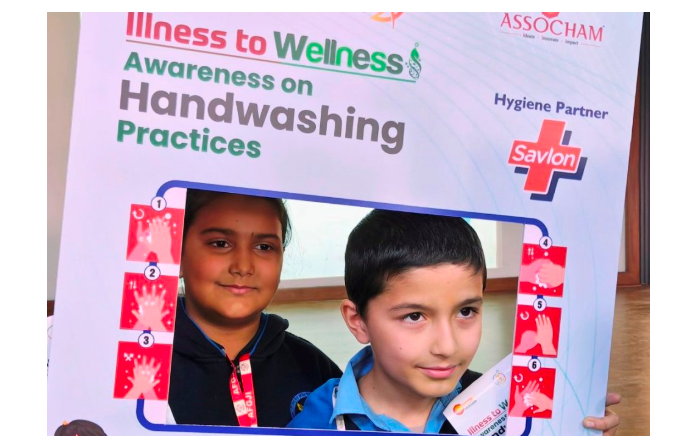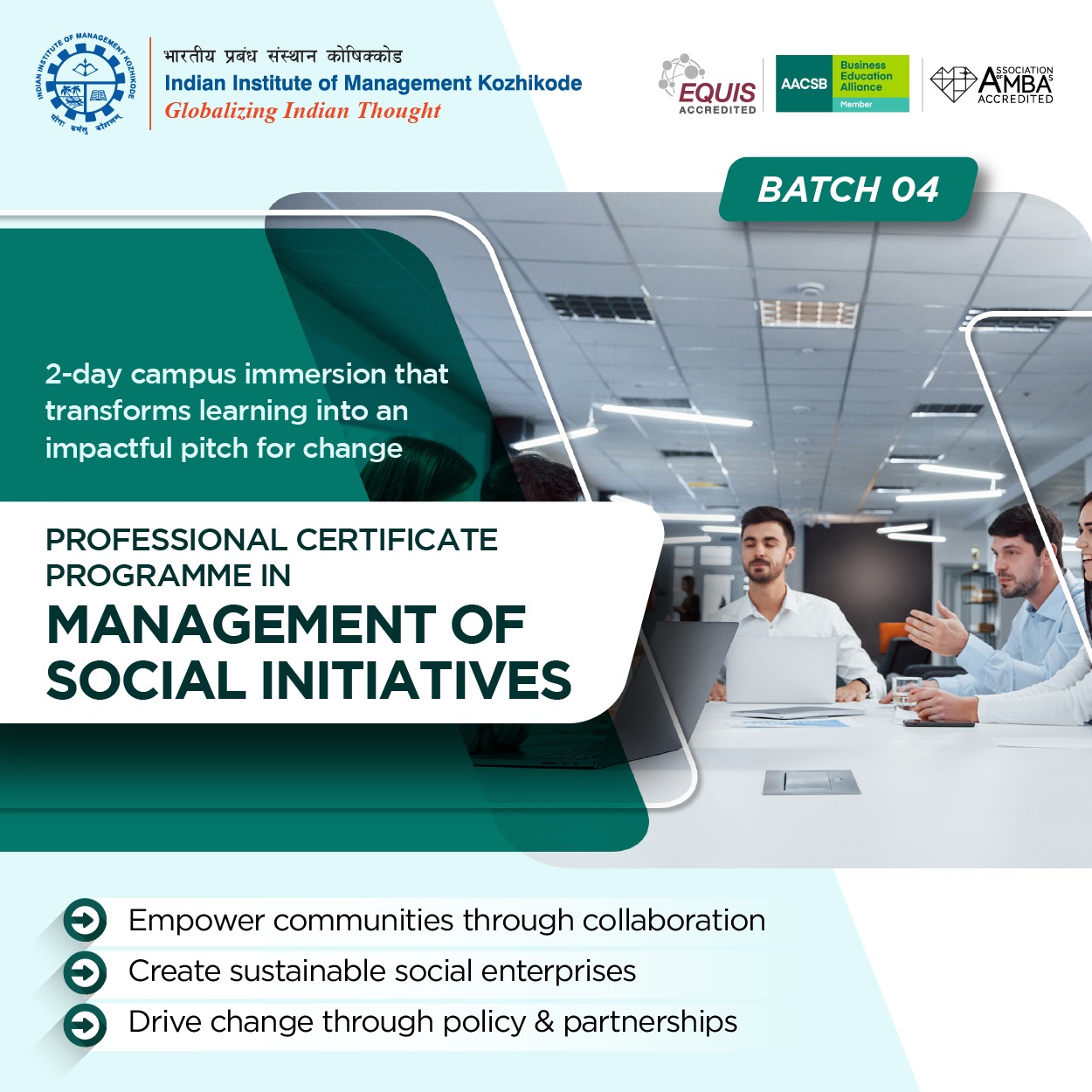Illness to Wellness: ASSOCHAM Foundation’s Handwashing Awareness Drive
June 13, 2025

ASSOCHAM Foundation
Inadequate hygiene practices in schools remain a major concern in India, contributing significantly to the spread of communicable diseases among children.
Shared surfaces, close physical proximity, and a lack of proper awareness about hand hygiene often result in increased absenteeism, lower academic performance, and a weakened immune response among students.
Despite its simplicity, handwashing is often overlooked as a first-line defense against disease transmission in educational environments. This creates a significant gap in the basic health and hygiene education provided to school-aged children, especially in densely populated and underserved areas.
To address this problem, the ASSOCHAM Foundation for Corporate Social Responsibility (AFCSR), the social arm of the Associated Chambers of Commerce and Industry of India, launched the ‘Illness to Wellness’ campaign in collaboration with hygiene brand Savlon.
As part of this initiative, a handwashing awareness demonstration activity was organized at the Air Force Golden Jubilee Institute in Subroto Park, New Delhi.
The program focused on empowering students, especially those in primary grades and children with special needs, with the knowledge and skills needed to practice effective hand hygiene. This awareness initiative aimed to instill lifelong health habits, reduce the spread of illnesses, and contribute to building a healthier and more responsible generation.
Addressing Hygiene Challenges in SchoolsMany schools in India face infrastructure and awareness limitations when it comes to promoting proper hygiene. A significant number of students are unaware of how diseases spread through unwashed hands or why washing hands at the right time is essential.
Improper or irregular handwashing can result in diseases like diarrhea, respiratory infections, skin irritations, and seasonal flu, which significantly disrupt learning and cause health burdens both at school and at home.
Recognizing these challenges, the ‘Illness to Wellness’ campaign focuses on preventive health education. It emphasizes teaching children that handwashing is more than a routine activity—it is a critical life skill. The campaign specifically targets younger students, particularly those in grades III to V, as habits formed early in life are more likely to become lasting behavioral practices.
Additionally, the inclusion of specially-abled children ensures that the campaign is inclusive, providing equal opportunity for every child to learn essential hygiene practices.
The initiative also addresses another critical issue: the need to equip teachers and school staff with the tools and knowledge to serve as facilitators of hygiene education. Teachers play a pivotal role in influencing student behavior, and their active participation helps reinforce hygiene principles within the classroom and beyond.
Implementing the Handwashing Awareness ProgramThe handwashing awareness demonstration at the Air Force Golden Jubilee Institute was designed to be both inclusive and interactive. Around 650 students from grades III to V and 80 specially-abled children participated in the activity. These sessions were structured to ensure maximum engagement, learning, and retention through fun, hands-on educational methods.
Health experts conducted live demonstrations showing the correct handwashing techniques, emphasizing steps such as using soap, washing for a sufficient duration, and cleaning often-missed areas like fingertips and under nails. These demonstrations were followed by hygiene quizzes, where children tested their understanding of hygiene concepts in a fun and engaging way.
Educators and school staff also participated in the sessions. Their role extended beyond supervision—they served as facilitators, guiding students through the handwashing process and reinforcing the importance of cleanliness.
Teachers were trained to integrate hygiene education into regular classroom activities, ensuring the message of hand hygiene remained consistent and relevant long after the event concluded.
To enhance learning, visual aids and posters were displayed in and around washroom areas as constant reminders for students to practice hand hygiene. These materials served as behavioral triggers, especially during key times such as before meals, after outdoor activities, and after using the toilet.
Engaging Activities and Student ParticipationA defining strength of the ‘Illness to Wellness’ campaign lies in its interactive, student-centric approach. By involving students directly through participatory learning, the initiative effectively reinforced key messages and motivated children to become hygiene ambassadors within their communities.
During the awareness activity, students eagerly took part in group exercises, handwashing drills, and quizzes that helped them understand the science of germ transmission and the impact of personal hygiene.
Children learned the importance of washing their hands before eating, after playing outside, and after using the restroom. The sessions were tailored to their comprehension levels and included relatable examples from their daily routines.
One of the standout components of the program was the student pledge, where children committed themselves to follow and promote proper handwashing habits. This simple yet powerful act helped solidify their commitment, turning what could have been a one-time lesson into a lifelong practice.
By giving students a sense of ownership over their hygiene, the initiative created a multiplier effect, as these children carried their learnings home and influenced the hygiene habits of their families.
Impact CreatedThe impact of the ‘Illness to Wellness’ initiative has been both immediate and far-reaching. Within the school, teachers and administrators observed noticeable changes in student behavior related to hygiene.
More children began washing their hands consistently before meals, after recess, and after using the bathroom. The frequency of student illnesses, particularly minor but recurring infections like colds and stomach upsets, began to decline, leading to better attendance and more focused classroom participation.
Beyond the school premises, the campaign succeeded in influencing community health. Students took their knowledge home, educating siblings and parents about proper handwashing techniques. This led to wider adoption of hygiene practices at the household level, especially in homes where such practices were previously neglected or misunderstood.
Teachers reported improved overall hygiene in classrooms and greater awareness among students about the role of cleanliness in disease prevention. Specially-abled children, who were included with adapted learning tools and personalized support, also showed strong grasp of the concepts—proving that inclusive hygiene education is both possible and impactful.
The combined effect of expert-led training, visual reinforcement, and hands-on student engagement created a positive behavioral shift, transforming hygiene from a health guideline into a cultural norm among children.
Way ForwardAs the ‘Illness to Wellness’ campaign gains momentum, the ASSOCHAM Foundation for CSR plans to expand the initiative across multiple schools in urban, semi-urban, and rural India. The goal is to replicate the success of the program at the Air Force Golden Jubilee Institute and develop scalable models that address regional hygiene challenges.
The initiative will explore partnerships with local educational boards, NGOs, and public health institutions to amplify reach and ensure effective delivery in under-resourced areas.
To complement in-person efforts, the campaign will roll out digital toolkits, including animated videos, gamified mobile applications, and interactive lessons to keep students engaged in a technology-friendly manner.
Scheduled health camps, refresher sessions, and parent-teacher meetings will ensure continued reinforcement of hand hygiene practices. Teachers will continue receiving training so that hygiene education becomes a core part of the school curriculum, not just an occasional event.
By embedding handwashing habits into the daily routines of students, and by working closely with teachers and parents, the campaign aims to achieve long-term cultural transformation. The ‘Illness to Wellness’ initiative aspires to shape a future where cleanliness and hygiene are second nature—empowering today’s children to become tomorrow’s health-conscious citizens and community leaders.
Ultimately, this movement is more than just an awareness campaign. It is a national call to action—an opportunity to change the health narrative for school children and ensure that every child, regardless of ability or background, grows up with the tools to lead a healthy, productive life.
Source

The Associated Chambers of Commerce and Industry of India (ASSOCHAM) is a non-governmental trade association and advocacy group based in New Delhi, India.
© Renalysis Consultants Pvt Ltd


.jpg)






